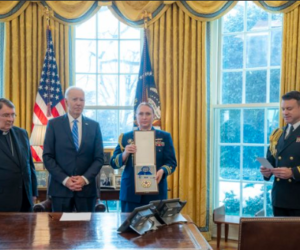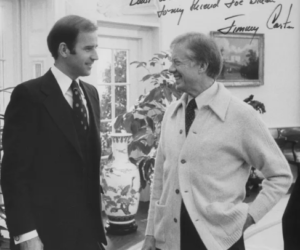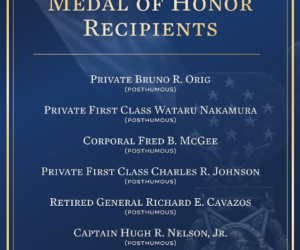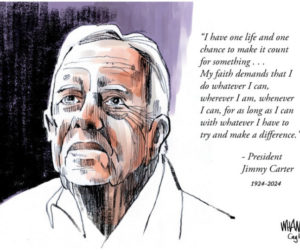by Ken Stone
Edgar Bergen and Shari Lewis were smiling in Ventriloquism heaven Tuesday when Darci Lynne Farmer wowed “America’s Got Talent.” (Charlie McCarthy, Lamb Chop and Charlie Horse were cheering Darci’s puppet Petunia.)

The Oklahoma youngster, who said she had practiced her craft only two years, got the Golden Buzzer from judge Mel B, and was advanced to a live show in the NBC series.
But what do professional ventriloquists think of Darci, who aims to be the variety show’s third ventriloquist winner (after Terry Fator in 2007 and Paul Zerdin in 2015)?
Does Darci have industry support in becoming the second 12-year-old in a row to win the $1 million grand prize — after ukulele-playing singer Grace VanderWaal?
MyNewsLa.com assembled a virtual panel of six veterans to assess the giggly newcomer.
Their verdict? Six thumbs way up.
San Diego’s Joe Gandelman, with 27 years’ experience, notes how the likes of Darci are good for everyone.
“I just booked a bar mitzvah for November in Northern California,” Gandelman said. “The bar mitzvah boy’s mother noted how she and her son love ‘America’s Got Talent’ and the ventriloquists — so good appearances by one ventriloquist can help business for the others.”
Los Angeles-based Justin Milan wrote: “I saw Darci perform for the first time at the Vent Haven International Ventriloquist Convention (Hebron, Kentucky) last summer. My first thought was, ‘She’s better than many adults who are full-time professionals.’”
Our other critics are Matt Bronsil, an English teacher in Taiwan who also does improv comedy and stand-up comedy as a ventriloquist; Steve Chaney of Sunnyvale, who with Corny Crow has performed for 20 years; David Crone of Ohio, a one-time AOL executive who’s been on stage for 30 years; and Chuck Field of Chicago and Scottsdale, Arizona, a 60-year-old comedy ventriloquist since age 10.

MYNEWSLA: How do you rate her technical skills? Is she disguising her mouth and throat movements well?
BRONSIL: Technically, her ventriloquism was amazing. She nailed every line perfectly, and the puppet skills were spot on.
CHANEY: Her technical skills are awesome for someone so young. Her mouth movement (or lack of) was perfect, she was relaxed. Someone who is nervous has to fight a little quivering with their lips, she didn’t. Extremely well done. There is nothing a ventriloquist can do to hide any throat movement except wear a turtleneck sweater. Darci Lynne showed very little to no throat movement.
CRONE: Darci has fantastic technique. Not only is her lip control excellent, her vocal separation (being able to distinguish the character’s voice from hers) and clarity are superb. Also, her physical manipulation of the character is very good. She gets 5s (out of 5) across the board from me on technical skills.
FIELD: I thought Darci Lynne’s lip control, and puppet manipulation was top-notch. All was very natural, not forced and believable.
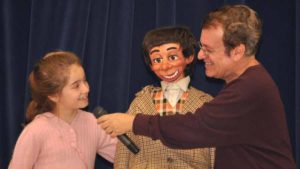
Ventriloquist Joe GandelmanGANDELMAN: She’s doing an excellent job. She is doing a great job on lip movement. As far as throat movement, you can’t really ever hide that and there’s no problem here.
MILAN: Her technical skills are fantastic. Main things I think could be improved upon:
1) At 1:32 of the video, she acts surprised at the puppet covering her mouth BEFORE the puppet’s hand actually landed on her mouth. Her timing was a little off.
2) Toward the beginning of her puppet’s song, Darci’s mouth is in a fake smile. It doesn’t look natural. Later in the song, her mouth is in a more relaxed-looking position. This tells me she probably knew the right thing to do (keep her mouth looking relaxed), but forgot to initially as a result of being on such a big stage at such a young age.
How do you rate her showmanship?
BRONSIL: I rate her showmanship better than most adults I have seen in any area of performance.
CHANEY: Great showmanship. She seemed very honest in her demeanor.
CRONE: Excellent. Clearly she has loads of experience on stage. She really connects with the audience.

FIELDFIELD: Her showmanship was way beyond her years. She was very confident, especially for a girl who says she had to overcome her shyness. Many of the most well-known ventriloquists of all time like Paul Winchell have mentioned that this art was a spring from shyness to being very outgoing.
GANDELMAN: She has excellent showmanship. I routinely do a how-to-do-ventriloquism bit that can go from 5 minutes to 15. Kids are VERY fast learners and extremely creative if given a chance and if their parents and others help nurture this creativity. Her appearance got rave reviews by ventriloquists all over the country (or world) on their Facebook pages and on some ventriloquist-related Facebook group pages.
MILAN: Her showmanship is excellent. Even when the “act” was over, she kept Petunia in character by using lifelike manipulation. That, to me, says more than what she did during the scripted performance. She has most likely put in a lot of practice hours to be able to pull that off. From a comedic standpoint, her facial expression and verbal response at 0:58 when Petunia announces she’s going to sing is perfect. She nailed it!
Is singing a special challenge for ventriloquists? Or was her choice an easy lift?
BRONSIL: Singing is hard for most people. Singing as a ventriloquist is even harder. Singers can generally open their mouth and get out what sounds they need. A ventriloquist makes those sounds without that luxury. Few ventriloquists sing well.
CHANEY: Songs are difficult in that you have to keep your lungs full of air while controlling the air/voice pressure with your stomach muscles, much like a singer does.
CRONE: Singing can be especially challenging for a ventriloquist. I’ve had a number of vocal coaches and each has been completely baffled as to how to teach singing when the mouth position is stationary. Her choice was certainly not an easy one. Listen to the range she exhibited. Wow! Difficulty is not really the issue, although I fully expect Darci to continue to impress us in that regard as she continues along in the competition.
More important is ENTERTAINING. You don’t go to a piano concert to listen to the pianist play scales and arpeggios. You go to hear music. Music should touch your soul. The goal is to convey the power of the music, not the difficulty of performing it. It should look easy. So if it looked easy, and you felt moved by the music, then she succeeded. I’d score her highly on that.

GANDELMAN: I disagree totally with those who say singing is difficult for ventriloquists. I’m not a singer and actually started out with lots of music in my show when I went full-time in November 1990. When you are doing a ventriloquism routine, you’re doing a script or ad libbing with many words. After you learn the basics (how to substitute letters) it’s not hard to do that.
Singing is actually EASIER since you are practicing the same song and lyrics with no ad libbed deviations from it over and over. I still occasionally do some music (my main dummy sings “La Bamba,” I do a nutty lip-sync with volunteers who get up and do “Tuitti Fruitti” wearing ratty wigs while I do the singing which is funny since I am not a great singer).
MILAN: Singing is not a special challenge for ventriloquists. It can be an easy lift. In fact, I use singing in my show when I want to gain instant audience approval. Especially if I use a hit song people are familiar with. People are often blown away when a ventriloquist sings. For some reason, they think it must be harder than just making the puppet talk.
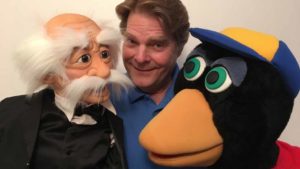
Yes, it’s challenging to make a puppet sing, but no more difficult than making it talk. Songs with a lot of “B” and “P” sounds in them are more challenging. Her choice of “Summertime” is smart because it gives her an opportunity to demonstrate her amazing vocals. As an aside, I’ve heard her make her puppet yodel. That impressed me even more. Maybe she’s saving that for the AGT semi-finals. ?
Do you agree with her statement: “I would really like to keep ventriloquism alive. Because it’s not common, you know”?
BRONSIL: Largely, that is true. Ventriloquists are a niche item in the performance world. ?
CHANEY: It is an uncommon ability, only because a person has to practice the technique over and over. I teach all ages, but today’s kids have so many distractions and opportunities for other activities, sometimes it’s difficult to find the time to practice, practice and practice.
CRONE: Each generation needs its own leaders to recharge and renew the interest in an art form. Jeff Dunham and Terry Fator have done wonders for renewing ventriloquism’s popularity. With her age, Darci has the opportunity to continue building on that to inspire a whole new group of young people.
FIELD: I do agree. I have been doing this since the age of 10 in an art where Edgar Bergen was the all-time star of ventriloquism. Although he was amazing, there is nothing there to make people feel like this is contemporary, relevant or event COOL. The future of any art form is getting young people interested and bringing freshness as well as taking something old and putting a new twist to make it modern and contemporary, but most importantly highly entertaining.
GANDELMAN: I don’t quite agree with it not being that common. In the early 1990s, when I quit the San Diego Union newspaper to do this, there weren’t a large number of part-time or full-time ventriloquists around. There were many magicians or family music acts that did a LITTLE ventriloquism. All of this started to change with the emergence of Ronn Lucas and Jeff Dunham.
So if you go to Gigmasters or Gig Salad (I’m on both of these sites) you will see lots of ventriloquists — still not as many as magicians, but there are more around now than 20 years ago. And the number I predict will grow. “America’s Got Talent” has helped give the once-vanishing art a boost.
MILAN: Yes. Although there has been a surge in interest in ventriloquism ever since Jeff Dunham gained prominence (2006), and Terry Fator won “America’s Got Talent” (2007), there are still very few who do it well.
One reason is that it requires someone to be a great: 1) Ventriloquist, and 2) Entertainer.
The novelty of doing “ventriloquism” will keep an audience entertained for only so long. After 5-15 minutes, the ventriloquist needs to be making them laugh (or doing something else that keeps them tuned in and on the edge of their seats) in order to succeed.
For your reference, the V may draw closer to 1,000 attendees each year. In 2005, attendance was probably closer to 350. Even in light of increased attendance, Darci is right: Compared with most hobbies, it may still belong on the endangered species list.
What else should readers know about ventriloquism or your view of her place in the profession?
BRONSIL: Ventriloquists get along really well. There is a convention every year. Sadly, since I live in Taiwan, I have not attended in over a decade, but it is a big conference in Kentucky every year.
Her place is a welcome place. She will probably have a lot of people that want to talk to her at the next convention if she attends. Her place in the professional world is up to her. She certainly has the talent to go far, but it is up to her if she wants to continue on that path or not. Either way, her skills in this area will certainly carry over to other areas.
CHANEY: Ventriloquism is fun to watch and to perform with. Kids do love puppets (I use soft puppets, similar style to what Darci Lynne used) and bringing them seemingly alive is great fun. I think she will be fantastic and her character, “Petunia,” is wonderful. I wholeheartedly welcome Darci to the profession. Having the art form so well represented by her is a boost to us all.

FIELD: The secret to ventriloquism is “There is no secret.” Like singing, it can be taught and learned. But most people will only be average. With the right training by people like “Gary Owen,” who taught Darci Lynne, encouragement by parents to pursue something that you love and lots of practice the possibilities are endless. Most importantly, the art of ventriloquism with the addition of great comedy material, characters as well as combining singing is a recipe for top-notch entertainment from your living room to Las Vegas.
GANDELMAN: Since she was on TV and has this credit, she WILL be going wherever she wants to go on ventriloquism. Also, she has “it” — the stage presence you can’t fake. Some try to teach it, but you look at ease or you don’t. She also has a great voice. If you add her stage presence, technique, great voice she’s on the fast track.
As always this will mean that some ventriloquists will now rush to get music to insert it in their act like they did when Terry Fator won “America’s Got Talent.” That’s fine — if you can sing well. There are many talented kids who go to the annual ventriloquists convention (where Jeff Dunham virtually grew up) as she does (one is a high schooler who is making me a great puppet).
I need to stress: Adults somehow get amnesia and forget how creative and talented kids can be and are. She reminds those who forget and she’s going to make some kids want to get into ventriloquism.
MILAN: She’s on the right track if she wants to set herself up for a full-time career as an adult. If this is the case, my recommendation is that her next step be to develop distinguishable characters that people can relate to. This will help her to be able to deliver a long show that is consistently enjoyable and has people wanting to come back for more.
Ken Stone is a longtime veteran reporter who writes for The Times of San Diego and MyNewsLA. This article is reprinted from MyNewsLa.

